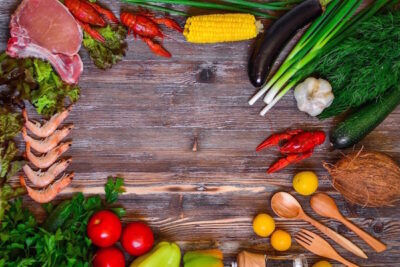Fueling Your Body For Daily Activities: 6 Top Tips

Have you ever experienced lack of energy at work, lack of energy in your workouts or lack of energy to tackle other daily activities? If you identify with any of these issues, you are not alone. Many of us experience one or all three of these lack of energy related challenges from time to time, but with a few changes, you will be fueling your body for all your daily activities in no time.
These 6 top tips will provide the boost your body needs to champion all your daily activities.
1. Develop Eating Routine
With the changes due to COVID-19, your schedule may be altered by children’s activities, work from home, zoom meetings and impromptu activities. This can lead to limited time left for fueling your body effectively. Unfortunately, skipping meals over an extended time period can cause extreme hunger. As a result, you are forced to overindulge in your next meal. Studies have shown that consuming a larger number of small meals may improve diet quality and may lower body mass index. Developing an eating routine can prevent a spike in hunger and avoid overeating. Ultimately, consuming your meals on a scheduled routine can promote a healthier diet and maximize your daily activities.
2. Include Carbohydrates With Every Meal
The three macronutrients that are responsible for energizing and supporting your body are carbohydrates, proteins and fats. These three macronutrients worked in combination to provide the resources necessary for the body’s optimal function.Carbohydrates are the main fuel source for your body and brain. Energy is provided to the body when carbohydrates are converted to glucose. Foods that are high in carbohydrates must be present in your diet to support your bodily function and physical activities. Healthy sources of carbohydrates are whole grains, vegetables, fruits and beans.
3. Build Your Body With Protein
Protein is the building block for life and it is found throughout your body such as, in your muscles, bones, skin, hair and tissues. It is essential for repairing and rebuilding your body at the cellular level. Some of the benefits protein provides includes muscle development, improved body composition, improved immune functionality, strengthened muscle tissue connectivity and promote recovery from exercise and injury. The main sources of protein are legumes, nuts, poultry, fish, dairy products, tofu and soy products.
4. Consume Good Fats
As it relates to dietary fats, the most important thing is the type of fat that is consumed. There is a lot of negative perception associated with fats, however research has shown that healthy fats are necessary and beneficial for your health. It is important to include “good fats” in your diet because it is essential for providing energy and supports the growth of our cells. In addition, “good fats” provide a protective mechanism for your organs and create a thermal shield for our bodies.
The two types of healthy “good fats” are monounsaturated fats and polyunsaturated fats. Some good sources of monounsaturated fats include, avocados, olives, olive oil, peanut oil, nuts (cashews, almonds, peanuts, hazelnuts, macadamia). Fats such as, walnuts, flaxseed, sunflower seeds, pumpkin seeds, salmon, tuna, sardines, trout, herring, mackerel, soymilk, tofu and safflower oil, are considered good sources. It is important to focus on foods that contain “good fats” and avoid those that contain “bad fats” like trans fats and saturated fats.
5. Make Your Plate Colorful
Make your plate colorful with fruits and vegetables to boost your daily intake of important nutrients. Colorful foods are rich in vitamins and antioxidants that are necessary to support healthy body systems and fight against diseases. To fully benefit from fruits and vegetables, consuming a wide variety every day is necessary, as no single fruit or vegetable can provide all of the nutrients you need.
The benefits of fruits and vegetables are numerous, including the lowering of blood pressure, reduces heart disease, prevents some types of cancer, and helps promote weight loss. There are numerous varieties of fruits and vegetables to choose from, so consume a diverse selection of produce to provide your body with the nutrients it needs.
6. Hydrate Throughout The Day
The body is made up of 60 percent water, so hydrating throughout the day is crucial to maintain every system function of the body including the muscles, the brain, the heart and the kidneys. Proper hydration is vital for the function of every cell in the body, which helps support joints lubrication, boost the immune system, regulate the body temperature, transport oxygen throughout the body and help with waste excretion.
Other benefits hydration provides to the body includes providing energy to muscles, maintaining youthfulness of the skin and helps to maintain weight through calories control. It is recommended that we consume 2 liters or half a gallon of water each day. Water is the best fuel for hydrating your body, however other drinks and food choices can aid in hydration as well. For example, consuming a variety of natural vegetables juice, natural fruits juices, herbal tea and milk can contribute to your daily water intake.
Summary
In summary, your body can be energized by developing a consistent healthy eating routine, as well as including healthy carbohydrates, proteins and “good fats” in your diet. By consuming a variety of fruits and vegetables, your body will receive vitamins and antioxidants that are necessary to support healthy body systems and fight against diseases. Also, proper hydration is essential for efficient functioning of our cells, promote joint lubrication, boost the immune system, regulate the body temperature, transport oxygen throughout the body and help with waste excretion.
Thank you for reading. We are here to inspire and provide you with the tools to look and feel your best.
The VCB FIT Blog Team











